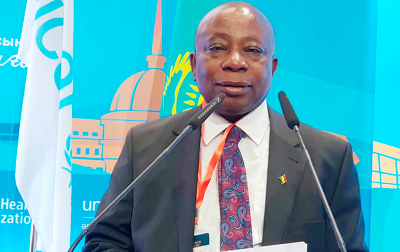
Ghana on course for universal health coverage — Minister
Ghana is on course to achieving universal health coverage (UHC), particularly at the primary health care level, the Minister of Health, Mr Kwaku Agyeman-Manu, has said.
He said 40 per cent of the Ghanaian population had access to health care through the Community-based Health Planning Services (CHPS) system.
Mr Agyeman-Manu said this during a panel presentation on the topic: “Integrating Primary Health Care-based delivery”, at the Global Conference on Primary Care at Astana, Kazakhstan.
CHPS
He stated that the CHPS system, which addressed geographical access to health delivery, was now the basic healthcare system adopted by the country.
Ghana, he added, had 6,000 CHPS zones which catered for the population in each catchment area and 700 CHPS compounds which provided services for patients with minor ailments.
Providers of services in the CHPS compounds, some of whom were midwives, also lived in the facilities, so that they could be accessible easily, the minister added.
“Currently, 875 CHPS compounds perform deliveries and there are plans to increase the number, so that more childbirths could be handled at that level of health care,” Mr Agyeman-Manu said.
The CHPS compounds, he elaborated, were supervised by district health facilities managed by physician assistants.
Equipment
The CHPS compounds were being equipped with the required basic tools and the minister indicated that each compound would be provided a means of transport, including vehicles, motorbikes for community health workers and bicycles for volunteers.
“All the equipment is in the country and distribution has started. By the first quarter of next year, all the CHPS compounds should be fully equipped,” he stated.
The equipment, funded by the United Kingdom Department for International Development (DFID) and the World Bank, includes weighing scales, delivery kits, blood pressure monitoring apparatus, clinical kits, thermometers, nutrition measurement equipment and nurses’ backpacks.
The Japanese International Cooperation Agency (JICA) is also providing additional support in the form of motorbikes for the Upper West, Upper East and Northern regions, while the Korean International Cooperation Agency (KOICA) is giving motorbikes for the Upper East Region.
NHIS
Aside from the CHPS programme, Mr Agyeman-Manu said the National Health Insurance Scheme (NHIS) provided financial accessibility to health care.
Forty per cent of active subscribers of the NHIS were in the rural areas, he added.
Contributing to the discussion, the Head of the Policy, Planning, Monitoring and Evaluation (PPME) Division of the Ghana Health Service, Dr Koku
Awoonor-Williams, indicated that Ghana was the only country that had developed a primary healthcare system and trained the right cadre of service providers to drive the system
He said the country had 12,000 community health nurses distributed in all the regions providing care, with each CHPS zone having at least four nurses.
Dr Awonoor-Williams disclosed that an assessment conducted by the ministry showed that not all the 6,000 CHPS zones were fully functional and so steps were being taken to address the shortfalls.
“For a CHPS zone to be fully functional, it must complete a 15-step process to be adequately prepared and positioned to provide the full complement of primary health care.
“This comprises health promotion, prevention, health education, treatment of minor ailments, effective referral, home visits, community mobilisation, family planning, maternal and child health and expanded programme on immunisation services,” Dr Awoonor-Williams said.
